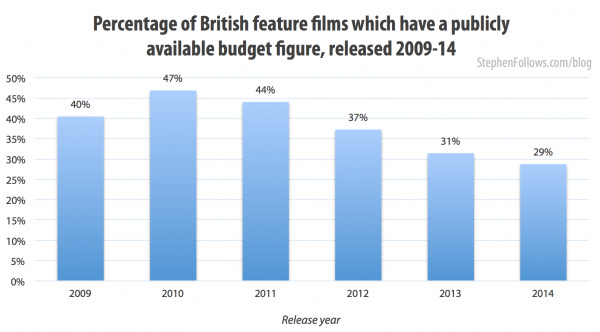Do filmmakers lie about their budgets?

Last week's article didn't feature any sexy charts, so I thought it would be a shame to disappoint film data nerds two weeks in a row. As penance, I thought I'd tackle a juicy topic I've had on my mind for a while: Do filmmakers lie about their budgets?
The short answer is - yes, all the time. There are times when you want your budget to seem higher than it actually is (to get noticed in the industry, to get a sales deal, to look cool at a party as the big-shot filmmaker) and sometimes when you want it to seem like you spent less than you actually did (getting good deals on kit and crew, when you're embarrassed at how much you wasted, to look cool at a party as the resourceful filmmaker). I took data from the BFI and HMRC and compared it with budget figures published online. In summary...
Between a third and a half of British films released 2009-14 have publicly declared what their film cost to make.
92% of films budgeted over £30 million declare a budget whereas for films under £150k it's 40%.
At least 30% of British films released 2009-14 lied about their budget - 8% claiming it cost less than it did and 22% inflating their budget.
43% of films actually made for £500k - £1m inflated their budgets publicly
35% of films actually made for £1m - £2m under-reported their budget.
On average, British filmmakers making films under £150k claim that their budget is £255k.
Of the sub-£150k films released in 2014, 21% claimed that their film cost over half a million pounds.
Micro-budget filmmakers are increasingly inflating their budgets.
Filmmakers blame distribution and marketing pressures
How can we find out what a film really cost?

The budgets for Hollywood films tend to make their way into the public domain via leaked documents, gossip from the vast number of people 'in the know' and reports to stockholders. However, lower budget films don't suffer from many of these leaks and so the only online source for most budgets is the filmmakers themselves. This makes is extremely easy to misrepresent your film's true cost.
In fact, there are very few places where filmmakers are forced to reveal the truth about their budget. All UK companies have to file annual statements with Companies House showing basic financial data, but these don't give enough detail to work out budgets. Films can be split across years, a company's overall income/expenditure could be across numerous projects and some films are co-productions, meaning the film's budget has been paid by more than one company.
Fortunately for us, the UK currently has a tax rebate system and a friendly government body. The producers of British films can claim back about a fifth of the money they spend on a film in the UK. You need to get your film officially certified as 'British', work out how much you're owed (for films budgeted under £20m, it's 25% of 80% of your total spend, or 25% of the money you spend in the UK - whichever is lower) and then submit your corporation tax return.

HMRC (i.e. the taxman) shares some of these details with the BFI, meaning that the BFI has accurate figures for how much every single British film cost to make.
They don't publish these figures in detail but they were kind enough to share budget range data with me. This means that for all recent British films, I know for a fact that one of the following budget ranges applies:
Over £30 million
Between £10 million and £30 million
Between £5 million and £10 million
Between £2 million and £5 million
Between £1 million and £2 million
Between £0.5 million and £1 million
Between £150k and £500k
Under £150k
These budget ranges are as factual as anything can be, because if anyone lied to HMRC then they would have been committing fraud. It does happen by only very rarely. I then cross-referred this data with publicly available data such as Wikipedia, IMDb, Box Office Mojo and interviews with filmmakers in order to measure how different the publicly stated budgets are from the legally-declared true budgets.
How many filmmakers publicly state their film's budget?
Across all British films released between 2009 and 2014 (including those not released yet but scheduled for a 2014 release) I found budget figures for 38% of them.

Approximately three out of every ten films has a budget published in the year it's released in cinemas. Over time this increases; there are published budgets for almost half of all the British films released in 2010.

Are they telling the truth?
The data available to me doesn't allow me to provide an absolute figure for the number of films with misleading publicly-stated budgets. However, it does allow me to see how many films claim a budget larger or smaller than the budget band they belong in. Across all British films budgeted up to £10 million and released between 2009 and 2014, 8% under-reported their budget (claiming it cost less than it did), 70% claimed a budget within the true budget range and 22% inflated their budget.

Due to the nature of the data I was allowed to use, it's certainly possible that the over- and under-reporting is more wide-spread than these figures suggest. If a film's true cost was £40,000 and the filmmakers inflated it three times by telling the world that it cost £120,000 then my research would still pick this up as being in the correct budget band (in this case "Under £150,000").
Who lies the most often?
By number, it appears that those films costing between £500k and £2 million need the greatest amount of budget 'massaging'. 43% of films made between £500k and £1 million inflated their budgets publicly and 35% of films made between £1 million and £2 million under-reported their budget.

Who lies the most?
On average, British filmmakers making films under £150k claim that their budget is £255k. Of the sub-£150k films released in 2014, 21% claimed that their film cost over half a million pounds.

Are filmmakers becoming more honest over time?
For films over £150k there appears to be no consistent trend. The relatively small number of films each year leads to wildly fluctuating averages year by year. However, in the "Under £150k" range there is a clear trend. This is important as films costing under £150k are by far and away the largest budget band, accounting for 37% of all British films released between 2009 and 2014.

Why are there so many inflated budgets?
For this article, I have been assuming that all published budgets come from the filmmakers themselves, but the truth is a bit more muddy. In many cases it's not the filmmakers who are releasing their budget figures, but other parties in the process. These include sales agents, distributors and publicists. As I alluded to at the top of this article, there are many reasons why a film's budget may be manipulated. In most cases it's to do with looking bigger in order to charge a higher price. Due to the huge uncertainties in the film distribution chain and because every film is unique, a film's "value" is highly subjective. Parties pay what they feel a film is worth, rather than consulting an independent third party source (such as when you buy or sell a used car). This means that looking bigger can work as a legitimate tactic in increasing revenue.
What do the filmmakers have to say for themselves?
I spoke to a few of the filmmakers who had the greatest discrepancies between the truth and the published figures. Most blamed their sales agent, with the most common reason being the requirement to be over a certain budget level in order to qualify for a deal (TV or VOD deals, mostly). I asked them how they felt about telling such big lies and most seemed slightly embarrassed with the benefit of hindsight. One filmmaker, whose published budget is over 10 times larger than the real cost said...
When you have £100k of your own money invested it's amazing what you'll justify is ok. I have mixed thoughts on it. Part of me really doesn't mind at all and the other part of me would rather not lie about my budget to make some money back. As it happens, that lie lead to an extra £10k in UK sales.
Epilogue on filmmakers lie about their budgets
Note: For all the data in this article, the figures relate to information publicly available in October 2014. It is possible that more budgets will be published before the end of year, and so the 2014 figures may not be complete. I'm very grateful to the BFI for providing me with a key part of the raw data for today's research. They asked me to abide by some rules when releasing this research, which is why I have not singled out any films in particular. I would absolutely love to have a chart of 'The Biggest Liars in the UK Film Industry' but, perhaps wisely, the BFI have asked me not to. *sigh* Ah well. So if you're reading this and were worried about seeing your film listed as an example of a massively inflated budget then you can relax. For now, at least, your lies remain unpublished. You know who you are. And so do I :)


